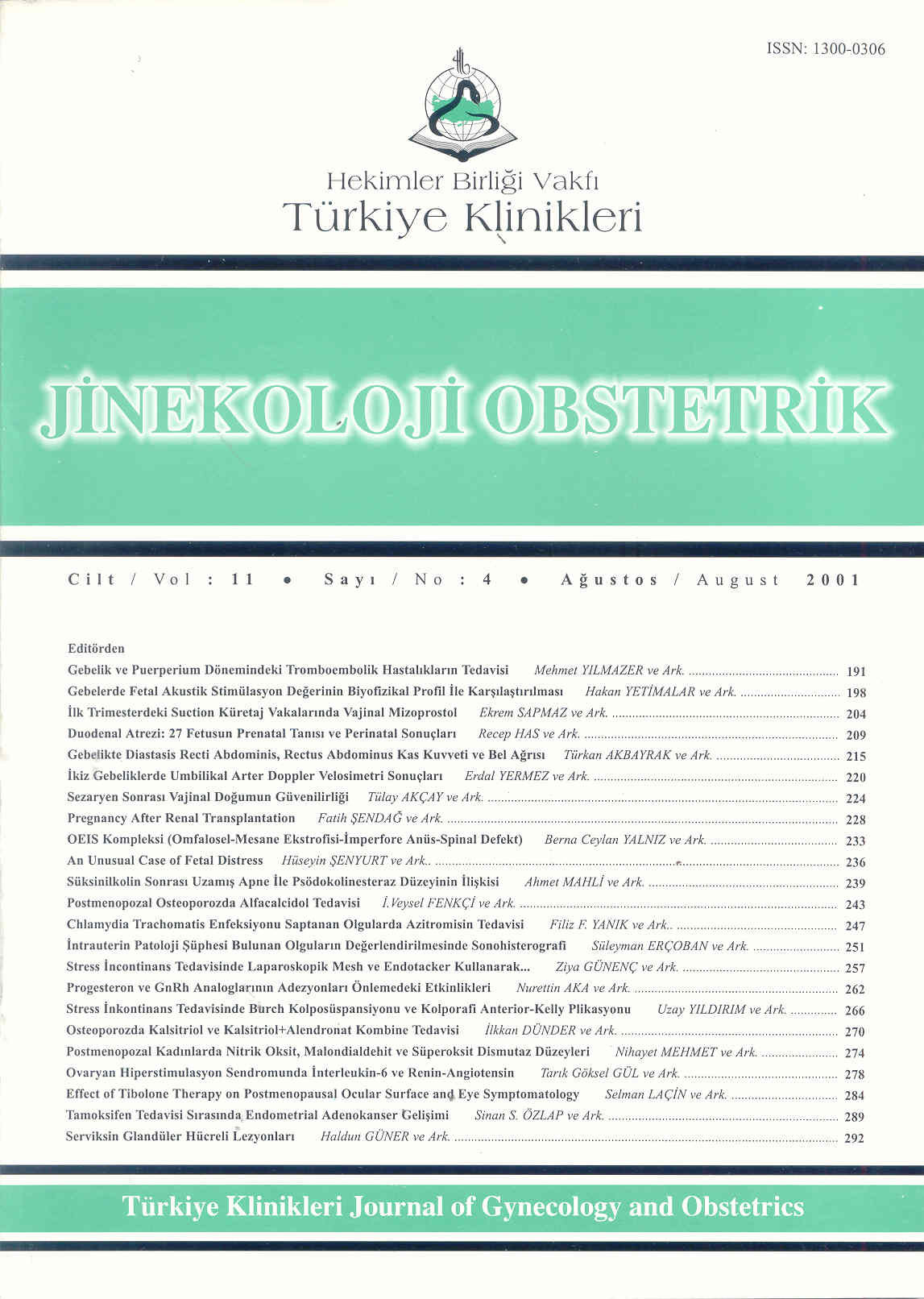Open Access
Peer Reviewed
ARTICLES
3620 Viewed2978 Downloaded
Duodenal Atresia: Prenatal Diagnosis And Perinatal Outcome Of 27 Fetuses
Duodenal Atrezi: 27 Fetusun Prenatal Tanısı ve Perinatal Sonuçları
Turkiye Klinikleri J Gynecol Obst. 2001;11(4):209-14
Article Language: TR
Copyright Ⓒ 2025 by Türkiye Klinikleri. This is an open access article under the CC BY-NC-ND license (http://creativecommons.org/licenses/by-nc-nd/4.0/)
ÖZET
Amaç: Duodenal atrezinin prenatal tanısı ile ilgili bazı sorunları, birlikte görülen diğer anomaliler ve kromozom anomalileri ile ilişkisini belirlemek ve obstetrik yönetim ve perinatal sonuçlarını tartışmak. Materyel ve Metod: 1988-1999 yılları arasında İstanbul Tıp Fakültesi Kadın Hastalıkları ve Doğum Anabilim Dalı, Prenatal Tanı Ünitesine refere edilen 20401 riskli gebelik içerisinden ultrasonografik incelemede duodenal atrezi tanısı konulan ve postnatal olarak tanısı doğrulanan 27 fetusun verileri incelendi. Polihidramniyos varlığı, tanı konulan gebelik haftası, birlikte görülen diğer anomaliler, kromozom anomalileri ile ilişkisi, ve perinatal sonuçları değerlendirildi. Bulgular: Toplam 43 fetusta duodenal obstrüksiyon tanısı kondu, 38 tanesinin postnatal akıbeti tam olarak belirlenebildi. Duodenal atrezi tanısı kesinleşen 27 fetustan on tanesinde (% 37.0) ek anomaliler de saptandı. Yirmiyedi olguda yedi trizomi 21 (%29.6), bir delesyon, bir translokasyon olmak üzere, toplam dokuz (%33.3) kromozom anomalisi saptandı. Pre ve postnatal 12 kayıpla duodenal atrezinin perinatal mortalitesi (%44.4) olarak hesaplandı. Onbeş bebek (%55.6) opere edildikten sonra sağlıklı olarak taburcu edildi. Sonuç: Duodenal atrezi, özellikle birlikte bulunduğu diğer anomaliler ve kromozom anomalileri nedeniyle perinatal mortalitesi yüksek bir malformasyondur. Geç de olsa prenatal dönemde tanı konulması, obstetrik tutumun belirlenmesinde ve neonatal yönetimde yararlı olmaktadır.
Amaç: Duodenal atrezinin prenatal tanısı ile ilgili bazı sorunları, birlikte görülen diğer anomaliler ve kromozom anomalileri ile ilişkisini belirlemek ve obstetrik yönetim ve perinatal sonuçlarını tartışmak. Materyel ve Metod: 1988-1999 yılları arasında İstanbul Tıp Fakültesi Kadın Hastalıkları ve Doğum Anabilim Dalı, Prenatal Tanı Ünitesine refere edilen 20401 riskli gebelik içerisinden ultrasonografik incelemede duodenal atrezi tanısı konulan ve postnatal olarak tanısı doğrulanan 27 fetusun verileri incelendi. Polihidramniyos varlığı, tanı konulan gebelik haftası, birlikte görülen diğer anomaliler, kromozom anomalileri ile ilişkisi, ve perinatal sonuçları değerlendirildi. Bulgular: Toplam 43 fetusta duodenal obstrüksiyon tanısı kondu, 38 tanesinin postnatal akıbeti tam olarak belirlenebildi. Duodenal atrezi tanısı kesinleşen 27 fetustan on tanesinde (% 37.0) ek anomaliler de saptandı. Yirmiyedi olguda yedi trizomi 21 (%29.6), bir delesyon, bir translokasyon olmak üzere, toplam dokuz (%33.3) kromozom anomalisi saptandı. Pre ve postnatal 12 kayıpla duodenal atrezinin perinatal mortalitesi (%44.4) olarak hesaplandı. Onbeş bebek (%55.6) opere edildikten sonra sağlıklı olarak taburcu edildi. Sonuç: Duodenal atrezi, özellikle birlikte bulunduğu diğer anomaliler ve kromozom anomalileri nedeniyle perinatal mortalitesi yüksek bir malformasyondur. Geç de olsa prenatal dönemde tanı konulması, obstetrik tutumun belirlenmesinde ve neonatal yönetimde yararlı olmaktadır.
ANAHTAR KELİMELER: Prenatal tanı, Duodenal Atrezi, Perinatal Sonuç, Fetal anomali
ABSTRACT
Objective: To discuss the prenatal diagnosis, obstetrical management, and perinatal outcome of duodenal atresia, and investigate the incidence of associated malformations and chromosomal anomalies. Institution: Istanbul University, Istanbul Medical Faculty, Department of Obstetrics and Gynecology. Materials and Methods: The data about 27 fetuses with duodenal atresia which were diagnosed on prenatal sonographic evaluation, and confirmed postnatally, among 20401 high risk pregnancies who were referred to Prenatal Diagnosis Unit of Obstetrics and Gynecology Department of Istanbul Medical Faculty between 1988 and 1999, are analyzed. Presence of polihydramnios, gestational week at diagnosis, associated malformations and chromosomal abnormalities, and perinatal outcomes were evaluated. Fishers exact test is used for statistical analysis. Results: Duodenal atresia was diagnosed in 43 fetuses, but postnatal outcomes of 38 fetuses could be obtained. Ten of the fetuses had additional abnormalities in 27 cases whom diagnosis was confirmed. Nine chromosomal abnormalities (33.3%) including seven trisomy 21 (29.6%), one deletion, one translocation anomaly detected. The perinatal mortality of duodenal atresia is found 44.4% with 12 prenatal and postnatal deaths. Fifteen infants discharged in a healthy condition after operations. Conclusion: Duodenal atresia, especially in the presence of associated abnormalities has a high perinatal mortality. Establishment of diagnosis in prenatal period, even in the late stages of gestation, may contribute the obstetrical and neonatal management.
Objective: To discuss the prenatal diagnosis, obstetrical management, and perinatal outcome of duodenal atresia, and investigate the incidence of associated malformations and chromosomal anomalies. Institution: Istanbul University, Istanbul Medical Faculty, Department of Obstetrics and Gynecology. Materials and Methods: The data about 27 fetuses with duodenal atresia which were diagnosed on prenatal sonographic evaluation, and confirmed postnatally, among 20401 high risk pregnancies who were referred to Prenatal Diagnosis Unit of Obstetrics and Gynecology Department of Istanbul Medical Faculty between 1988 and 1999, are analyzed. Presence of polihydramnios, gestational week at diagnosis, associated malformations and chromosomal abnormalities, and perinatal outcomes were evaluated. Fishers exact test is used for statistical analysis. Results: Duodenal atresia was diagnosed in 43 fetuses, but postnatal outcomes of 38 fetuses could be obtained. Ten of the fetuses had additional abnormalities in 27 cases whom diagnosis was confirmed. Nine chromosomal abnormalities (33.3%) including seven trisomy 21 (29.6%), one deletion, one translocation anomaly detected. The perinatal mortality of duodenal atresia is found 44.4% with 12 prenatal and postnatal deaths. Fifteen infants discharged in a healthy condition after operations. Conclusion: Duodenal atresia, especially in the presence of associated abnormalities has a high perinatal mortality. Establishment of diagnosis in prenatal period, even in the late stages of gestation, may contribute the obstetrical and neonatal management.
MENU
POPULAR ARTICLES
MOST DOWNLOADED ARTICLES





This journal is licensed under a Creative Commons Attribution-NonCommercial-NoDerivatives 4.0 International License.










